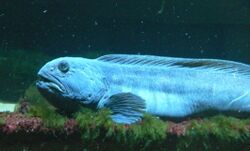Biology:Zoarcoidei
| Zoarcoidei | |
|---|---|

| |
| Atlantic wolffish Anarhichas lupus | |
| Scientific classification | |
| Domain: | Eukaryota |
| Kingdom: | Animalia |
| Phylum: | Chordata |
| Class: | Actinopterygii |
| Order: | Scorpaeniformes |
| Suborder: | Zoarcoidei Gill, 1893[1] |
| Families | |
|
see text | |
Zoarcoidei is a suborder of marine ray-finned fishes belonging to the order Scorpaeniformes. The suborder includes the wolffishes, gunnels and eelpouts. The suborder includes about 400 species. These fishes predominantly found in the boreal seas of the northern hemisphere but they have colonised the southern hemisphere.
Taxonomy
Zoarcoidei was first proposed as a taxonomic grouping by the American zoologist Theodore Gill in 1893 as the superfamily Zoarceoidea.[1] The 5th edition of Fishes of the World classifies the Zoarcoidei as a suborder within the order Scorpaeniformes.[2] Other authorities classify this taxon as the infraorder Zoarcales wihin the suborder Cottoidei of the Perciformes because removing the Scorpaeniformes from the Perciformes renders that taxon non monophyletic.[3] The monophyly of this grouping has still not been fully ascertained but it is generally accepted that the most basal family is Bathymasteridae.[2]
Timeline
<timeline> ImageSize = width:1000px height:auto barincrement:15px PlotArea = left:10px bottom:50px top:10px right:10px
Period = from:-65.5 till:10 TimeAxis = orientation:horizontal ScaleMajor = unit:year increment:5 start:-65.5 ScaleMinor = unit:year increment:1 start:-65.5 TimeAxis = orientation:hor AlignBars = justify
Colors =
#legends id:CAR value:claret id:ANK value:rgb(0.4,0.3,0.196) id:HER value:teal id:HAD value:green id:OMN value:blue id:black value:black id:white value:white id:cenozoic value:rgb(0.54,0.54,0.258) id:paleogene value:rgb(0.99,0.6,0.32) id:paleocene value:rgb(0.99,0.65,0.37) id:eocene value:rgb(0.99,0.71,0.42) id:oligocene value:rgb(0.99,0.75,0.48) id:neogene value:rgb(0.999999,0.9,0.1) id:miocene value:rgb(0.999999,0.999999,0) id:pliocene value:rgb(0.97,0.98,0.68) id:quaternary value:rgb(0.98,0.98,0.5) id:pleistocene value:rgb(0.999999,0.95,0.68) id:holocene value:rgb(0.999,0.95,0.88)
BarData=
bar:eratop bar:space bar:periodtop bar:space bar:NAM1 bar:NAM2 bar:NAM3 bar:NAM4 bar:NAM5 bar:NAM6
bar:space bar:period bar:space bar:era
PlotData=
align:center textcolor:black fontsize:M mark:(line,black) width:25 shift:(7,-4) bar:periodtop from: -65.5 till: -55.8 color:paleocene text:Paleocene from: -55.8 till: -33.9 color:eocene text:Eocene from: -33.9 till: -23.03 color:oligocene text:Oligocene from: -23.03 till: -5.332 color:miocene text:Miocene from: -5.332 till: -2.588 color:pliocene text:Plio. from: -2.588 till: -0.0117 color:pleistocene text:Pleist. from: -0.0117 till: 0 color:holocene text:H.
bar:eratop from: -65.5 till: -23.03 color:paleogene text:Paleogene from: -23.03 till: -2.588 color:neogene text:Neogene from: -2.588 till: 0 color:quaternary text:Q.
PlotData=
align:left fontsize:M mark:(line,white) width:5 anchor:till align:left
color:miocene bar:NAM1 from: -11.608 till: 0 text: Araeosteus color:pliocene bar:NAM2 from: -5.332 till: 0 text: Anarhichas color:pliocene bar:NAM3 from: -5.332 till: 0 text: Lycodopsis color:pliocene bar:NAM4 from: -5.332 till: 0 text: Lyconectes color:pleistocene bar:NAM5 from: -2.588 till: 0 text: Anarrhichthys color:pleistocene bar:NAM6 from: -2.588 till: 0 text: Zoarces
PlotData=
align:center textcolor:black fontsize:M mark:(line,black) width:25
bar:period from: -65.5 till: -55.8 color:paleocene text:Paleocene from: -55.8 till: -33.9 color:eocene text:Eocene from: -33.9 till: -23.03 color:oligocene text:Oligocene from: -23.03 till: -5.332 color:miocene text:Miocene from: -5.332 till: -2.588 color:pliocene text:Plio. from: -2.588 till: -0.0117 color:pleistocene text:Pleist. from: -0.0117 till: 0 color:holocene text:H.
bar:era from: -65.5 till: -23.03 color:paleogene text:Paleogene from: -23.03 till: -2.588 color:neogene text:Neogene from: -2.588 till: 0 color:quaternary text:Q.
</timeline>
Superfamilies and Families
Zoarcoidei has the following superfamilies and families classified under it:[2][4]
- Superfamily:Anarhichadoidea
- Family:Anarhichadidae Bonaparte, 1835 (wolffishes)
- Family:Cryptacanthodidae Gill, 1861
- Family:Pholidae Gill, 1893 (gunnels)
- Family:Stichaeidae Gill, 1864 (pricklebacks)
- Superfamily:Bathymasteroidea
- Family:Ptilichthyidae Jordan & Gilbert, 1883 (Quillfish)
- Family:Bathymasteridae Jordan & Gilbert, 1883 (ronquils)
- Superfamily:Zaproroidea
- Family:Scytalinidae Jordan & Starks, 1895
- Family:Zaproridae Jordan, 1896 (prowfish)
- Superfamily:Zoarcoidea
- Family:Eulophiidae H. M. Smith, 1902 (Spinous eelpouts)[5]
- Family:Zoarcidae Swainson, 1839 (eelpouts)
Etymology
Zoarcoidei is based on the genus name Zoarces which was coined by Georges Cuvier in 1829 and which means "live bearing", as in the type species Zoarces viviparus, the viviparous blenny.[6]
Characteristics
The Zoarcoidei families all share a single feature, the possession of a single nostril, and there is no other features or group of features which mark out the Zoarcoids as a taxonomic grouping.[2]
Distribution
The Zoarcoidei is thought to have originated in the northern hemisphere, particularly the northwestern Pacific Ocean and one of the families, the Zoarcidae, has colonised the southern hemisphere on a number of occasions.[7]
References
- ↑ 1.0 1.1 M. Eric Anderson (1994). "Systematics and Osteology of the Zoarcidae (Teleostei: Perciformes)". Ichthyological Bulletin of the J.L.B. Smith Institute of Ichthyology (60). ISSN 0073-4381. http://hdl.handle.net/10962/d1019910.
- ↑ 2.0 2.1 2.2 2.3 J. S. Nelson; T. C. Grande; M. V. H. Wilson (2016). Fishes of the World (5th ed.). Wiley. pp. 478–482. ISBN 978-1-118-34233-6.
- ↑ Ricardo Betancur-R; Edward O. Wiley; Gloria Arratia et al. (2017). "Phylogenetic classification of bony fishes". BMC Evolutionary Biology 17 (162): 162. doi:10.1186/s12862-017-0958-3. PMID 28683774.
- ↑ Richard van der Laan; William N. Eschmeyer; Ronald Fricke (2014). "Family-group names of Recent fishes". Zootaxa 3882 (2): 001–230. doi:10.11646/zootaxa.3882.1.1. PMID 25543675. https://www.researchgate.net/publication/268078514.
- ↑ Hyuck Joon Kwun; Jin-Koo Kim (2003). "Molecular phylogeny and new classification of the genera Eulophias and Zoarchias (PISCES, Zoarcoidei)". Molecular Phylogenetics and Evolution 69 (3): 787–795. doi:10.1016/j.ympev.2013.06.025.
- ↑ Christopher Scharpf; Kenneth J. Lazara, eds (6 May 2022). "Order Perciformes (Part 11): Suborder Cottoidea: Infraorder Zoarcales: Family Zoarcidae (eelpouts)". The ETYFish Project Fish Name Etymology Database. Christopher Scharpf and Kenneth J. Lazara. https://etyfish.org/perciformes14/.
- ↑ Radchenko, Olga (2016). "Timeline of the evolution of eelpouts from the suborder Zoarcoidei (Perciformes) based on DNA variability". Journal of Ichthyology 56 (4): 556–568. doi:10.1134/S0032945216040123.
- Sepkoski, Jack (2002). "A compendium of fossil marine animal genera". Bulletins of American Paleontology 364: 560. http://strata.ummp.lsa.umich.edu/jack/showgenera.php?taxon=611&rank=class. Retrieved 2011-05-18.
Wikidata ☰ Q300930 entry
 |

